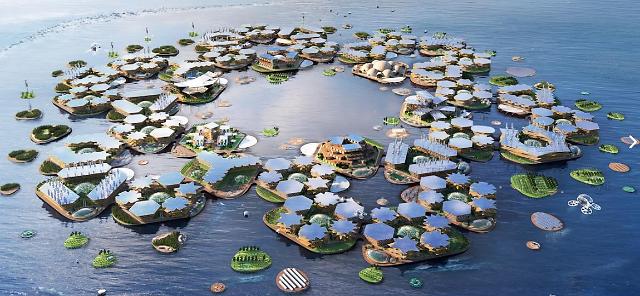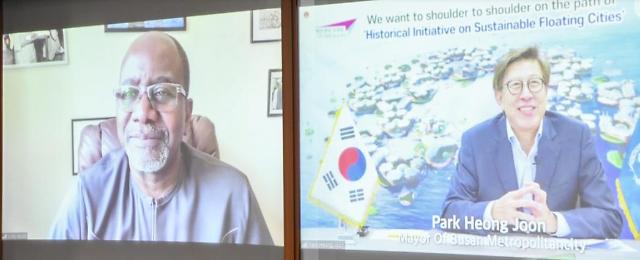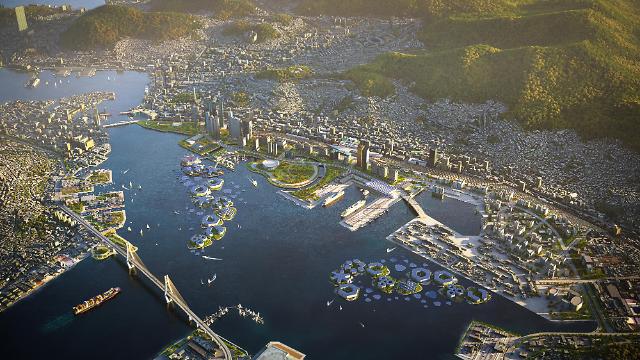
[Courtesy of OCEANIX]
SEOUL -- The world's first prototype of a floating community to be built in South Korea's southern port city of Busan for a United Nations project to present a solution to ensure climate resilience will be designed to accommodate thousands of residents living on an ideal eco-village where water leisure and daily life harmonize.
As the world's coastal cities are increasingly threatened by rising populations and sea levels, the UN is exploring a new approach to building offshore hubs of habitation. Busan has been selected by UN-Habitat, a UN agency responsible for sustainable urban development, as a partner city to build a flood-proof prototype called "Oceanix Busan."
UN-Habitat, Busan and Oceanix, a blue tech company based in the United States, unveiled the design of the world's first prototype sustainable floating city at the UN headquarters in New York. Oceanix Busan aims to provide breakthrough technology for coastal cities facing severe land shortages that are compounded by climatic threats.
"We cannot solve today's problems with yesterday's tools. We need to innovate solutions to global challenges. But in this drive for innovation, let's be inclusive and equitable and ensure we leave no one and no place behind," UN-Habitat's executive director Maimunah Mohd Sharif said in a joint statement.
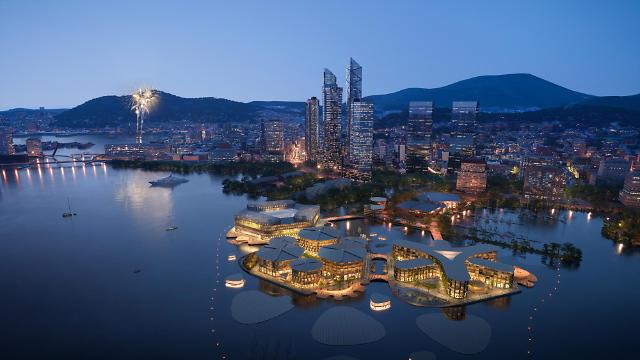
[Courtesy of OCEANIX]
Rendered images released by Oceanix showed a cluster of modern living quarters built on separated platforms, a communal backyard decorated with flower gardens, canal-side trails, an aquaponic forest, a public space created under a transparent roof, and an alley lined by restaurants, cafes and shops.
Floating platforms connected to land with link-span bridges frame the sheltered blue lagoon of floating recreation, art, and performance outposts. The low-rise buildings on each platform, defined by their soft lines, feature terraces for indoor-outdoor living activating the network of vibrant public spaces.
OCEANIX Busan has six integrated systems: zero waste and circular systems, food, net-zero energy, innovative mobility, coastal habitat regeneration, and closed-loop water systems which have a reduced chance of contamination. Interconnected systems will generate 100 percent of the required operational energy on site through floating and rooftop photovoltaic panels. Each neighborhood will treat and replenish its own water, reduce and recycle resources, and provide innovative urban agriculture.
"Today is a pivotal milestone for all coastal cities and island nations on the frontlines of climate change. We are on track to delivering Oceanix Busan and demonstrating that floating infrastructure can create new land for coastal cities looking for sustainable ways to expand onto the ocean, while adapting to sea-level rise," Oceanix CEO Philipp Hofmann was quoted as saying.
Oceanix has led a team of designers, engineers, and sustainability experts in designing the flood-proof prototype. The lead architects are Samwoo Architects and Engineers, an architectural design firm in South Korea, and BIG-Bjarke Ingels Group, a Copenhagen-headquartered group of architects, designers, and builders.
Bjarke Ingels, who founded BIG-Bjarke Ingels Group, said that Oceanix Busan would expand the city's unique character and culture from dryland into the water around it. "We believe Oceanix's floating platforms can be developed at scale to serve as the foundations for future resilient communities in the most vulnerable coastal locations on the frontlines of climate change."
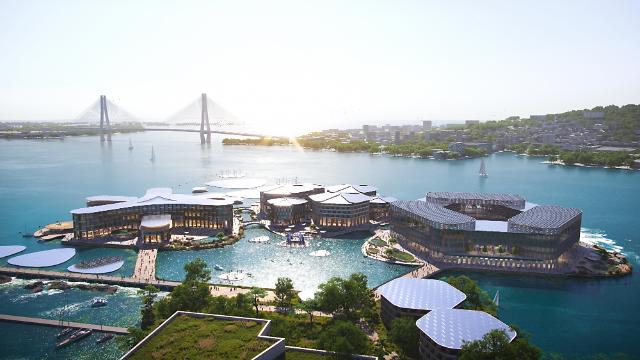
[Courtesy of OCEANIX]
Mayor Park Heong-joon thinks the floating city project will bolster the city's bid for World Expo 2030, a global economic event officially known as International Registered Exhibitions which has been held every five years for six months. The World Expo venue becomes a showcasing ground for various enterprises, government organizations, research groups and civic groups. Many think it is the window to present future solutions and ideas to visitors.
Busan has described sustainable floating cities as a modern version of Noah's ark that meets energy and food demands without destroying the marine ecosystem. Park anticipates various positive effects such as preemptive response to the climate crisis, economic stimulus in South Korea's shipbuilding and plant industries, technology development related to floating cities, and the maintenance of legal systems. With major industrial complexes and shipyards located within an hour's drive, the port city is undergoing a structural change to become a smart port.


